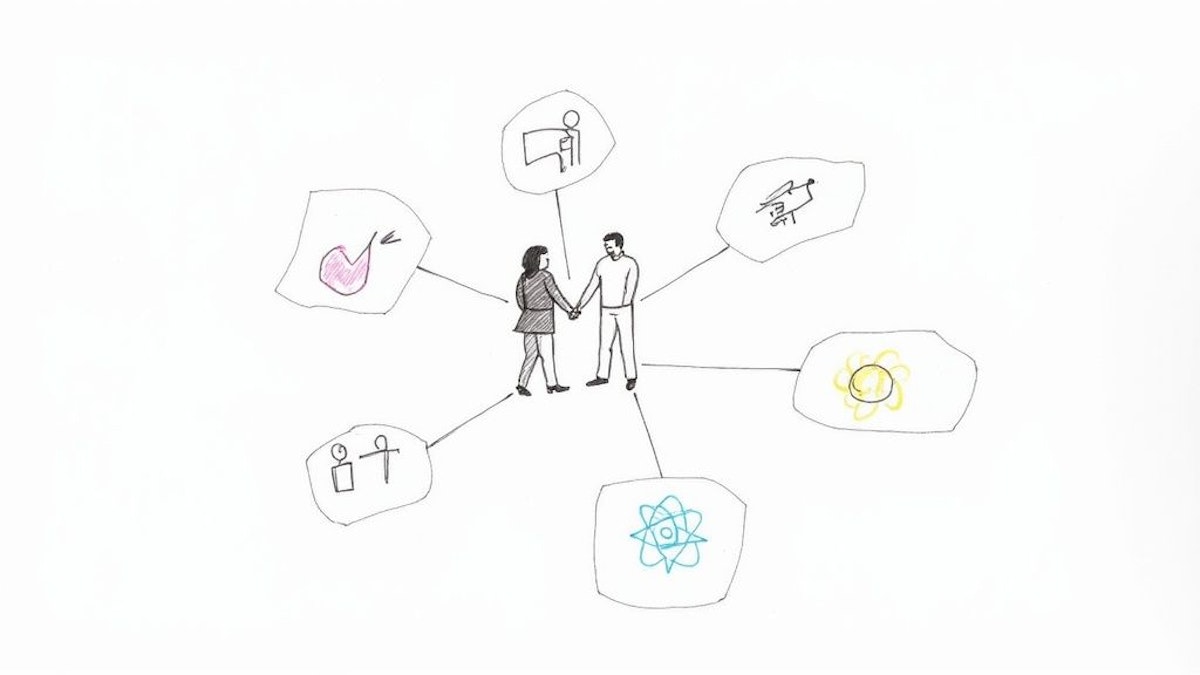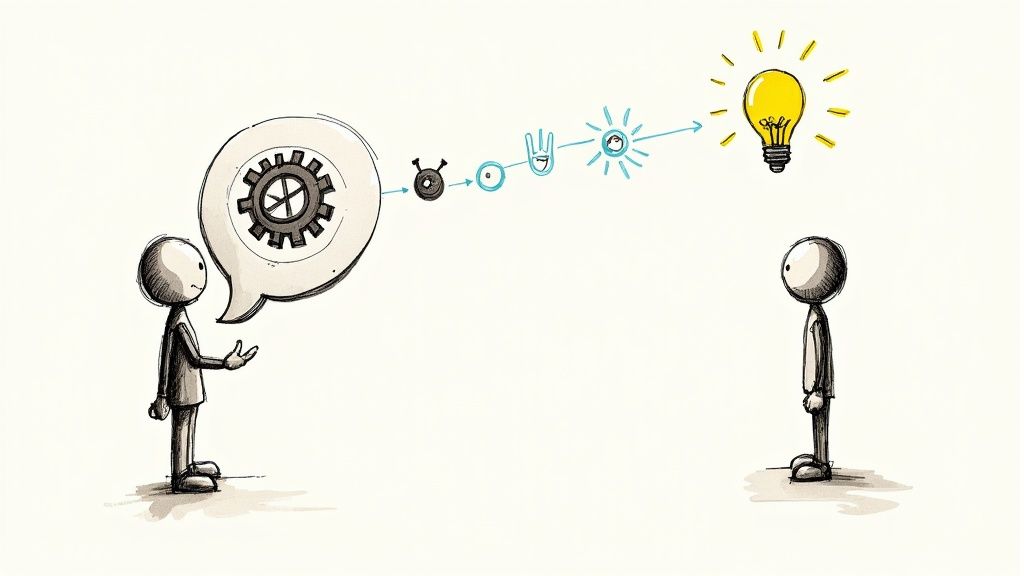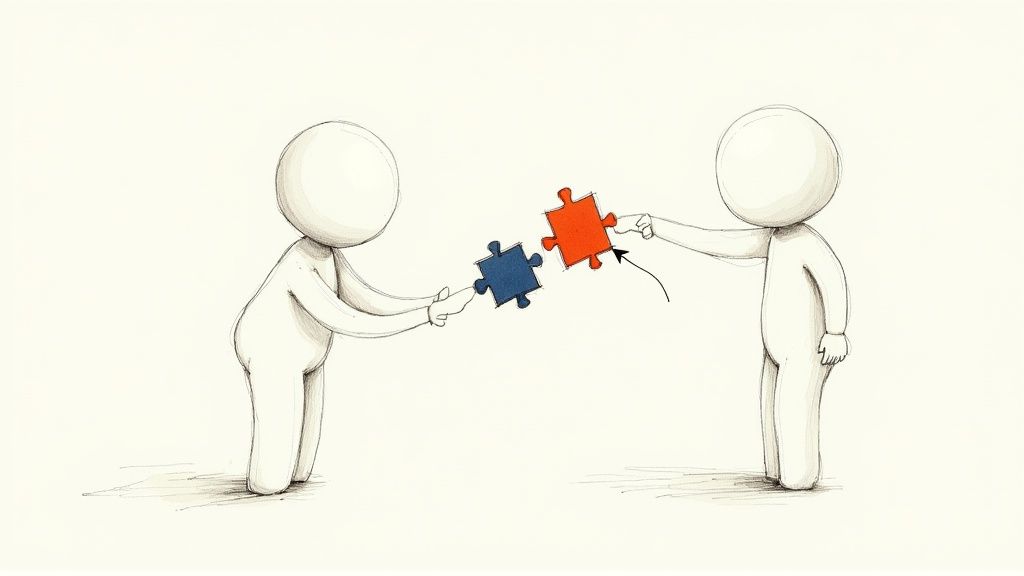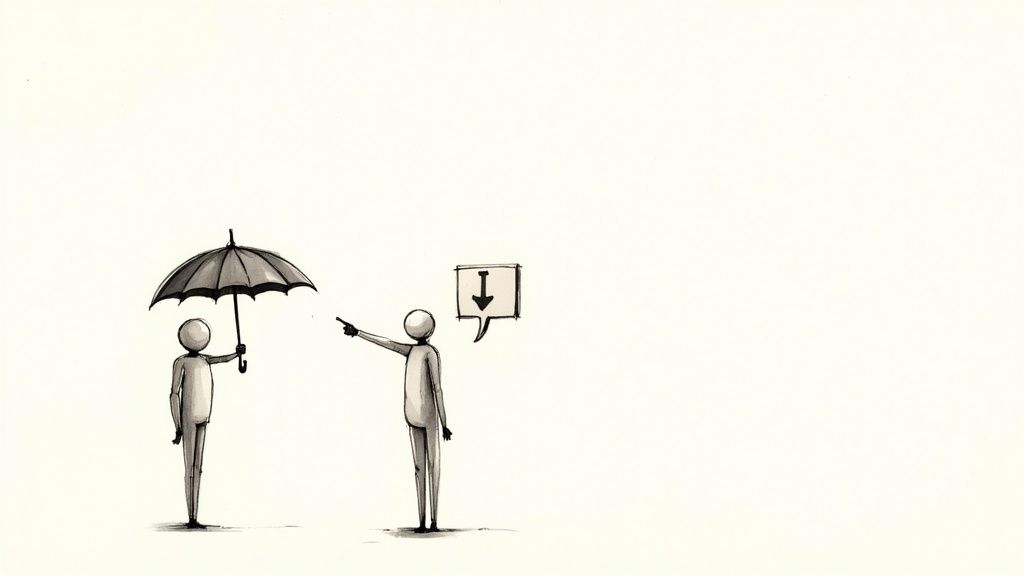Top 7 Interview Questions for Interpersonal Skills (2025 Guide)

In today's collaborative workplace, technical proficiency is only half the story. The real differentiator between a good hire and a great one often lies in their interpersonal skills. Research consistently highlights the importance of these abilities; a 2019 study by the National Association of Colleges and Employers (NACE) found that the ability to work effectively within a team is one of the top attributes employers seek in new college graduates. Yet, assessing these so-called 'soft' skills during an interview can be deceptively difficult. Standard questions often elicit rehearsed, generic answers that fail to reveal a candidate's true collaborative potential.
This guide moves beyond hypotheticals. We provide seven evidence-based interview questions for interpersonal skills designed to uncover a candidate's genuine abilities in communication, collaboration, and conflict resolution. Each question is structured to probe past behaviors, which are a far more reliable predictor of future performance than abstract self-assessments. By focusing on concrete examples, you can gain a clearer picture of how a candidate navigates complex social dynamics and contributes to a positive team environment. Beyond individual interactions, true assessment of interpersonal skills extends to how candidates contribute to team environments. Discover strategies for improving team collaboration and fostering a more cohesive workplace.
1. Tell me about a time when you had to work with a difficult team member or colleague
This classic behavioral question is a cornerstone of assessing interpersonal skills because it directly probes a candidate's real-world conflict resolution abilities. Rather than asking for a hypothetical response, it requires candidates to deconstruct a past experience, revealing their emotional intelligence, communication strategies, and professionalism under pressure. It's a powerful tool for moving beyond a candidate's self-proclaimed teamwork skills to see how they actually perform when collaboration becomes challenging.
A landmark meta-analysis published in the Journal of Applied Psychology by Schmidt and Hunter (1998) found that past behavior, as assessed through structured interviews, is a significant predictor of future job performance. This is why behavioral questions like this are so effective. They provide concrete evidence of a candidate's competencies, making them a reliable data point for hiring decisions. This question specifically targets a candidate’s ability to maintain productivity and positive relationships despite interpersonal friction, a critical skill in any collaborative environment.

What to Look For in a Candidate's Answer
A strong response will not place blame but will instead focus on professional actions and positive resolutions. The best candidates demonstrate empathy and a desire to understand the other person's perspective, even when they disagree.
- Ownership: The candidate focuses on what they did to improve the situation, not on the other person's faults.
- Professionalism: They avoid overly emotional language or personal attacks, keeping the narrative focused on work-related challenges and solutions.
- Problem-Solving: The candidate describes specific, actionable steps they took, such as initiating a private conversation, setting clear expectations, or finding a compromise.
- Positive Outcome: The story concludes with a resolution that either improved the working relationship, successfully completed the project, or provided a valuable lesson for future collaborations.
Pro Tip: Listen for the use of "I" statements. A candidate who says, "I scheduled a meeting to understand their workload," shows more initiative and accountability than one who says, "We were always arguing about the timeline."
The structure of the answer is also revealing. A candidate who can clearly articulate the Situation, Task, Action, and Result (STAR method) demonstrates strong communication and analytical skills, which are key interpersonal skills in themselves. This organized approach shows they can reflect on their experiences and learn from them, a trait essential for growth and adaptability within a team.
2. Describe a situation where you had to communicate complex information to someone without technical expertise
This question is a direct test of a candidate's empathy, adaptability, and clarity of thought. It moves beyond general claims of being a "good communicator" and asks for evidence of their ability to translate specialized knowledge into accessible language for a non-expert audience. This is a critical interpersonal skill in today's increasingly cross-functional and collaborative workplaces, where technical experts must regularly interact with sales, marketing, and leadership teams.
According to a 2018 Salesforce report, 86% of employees and executives cite a lack of effective collaboration and communication as the main cause for workplace failures. This highlights the immense value of employees who can bridge knowledge gaps between departments. This interview question effectively simulates this common business challenge, revealing whether a candidate can simplify without being condescending, ensure understanding, and ultimately drive collective progress. It’s particularly valuable for roles that interface with clients or stakeholders who may not share the same technical background.

What to Look For in a Candidate's Answer
A strong answer will demonstrate a clear understanding of the audience's perspective and a strategic approach to communication. The best candidates will focus on the listener's needs rather than their own expertise, using analogies and simple language to convey the core message. Many organizations use specialized communication assessment tools to evaluate this skill systematically.
- Audience Awareness: The candidate explicitly mentions who they were speaking to and how they tailored their message for that specific audience.
- Simplification, Not Omission: They show how they broke down complex topics into digestible parts without losing the essential meaning.
- Use of Analogies: The candidate might use a metaphor or a real-world comparison to make a technical concept relatable (e.g., explaining a server firewall by comparing it to a building's security guard).
- Feedback Loop: They describe how they checked for understanding, such as asking questions or pausing to let the listener process the information.
Pro Tip: Pay attention to the candidate's non-verbal cues as they answer. A candidate who makes eye contact and uses open body language often has a natural ability to connect with and engage their audience, which is a key component of effective communication.
The candidate's ability to structure their story using the STAR method is also a great indicator of their communication skills. A clear narrative that outlines the Situation (the complex topic), Task (the need to explain it), Action (the specific communication techniques used), and Result (the listener's understanding and the positive outcome) shows that they are not only skilled communicators but also reflective professionals.
3. Give me an example of when you had to persuade someone to see things from your perspective
This question moves beyond basic communication and into the more nuanced realm of influence and negotiation. It’s designed to assess a candidate's ability to articulate a vision, build a compelling case, and respectfully guide others toward a different point of view. This isn't about manipulation; it's about strategic communication, empathy, and building consensus, which are critical leadership and collaboration skills. It helps interviewers understand if a candidate can drive change and gain buy-in without resorting to authority.
This type of question is particularly valuable because effective persuasion is directly linked to organizational success. Research from professors at the Kellogg School of Management, such as in the book Influence Without Authority by Allan Cohen and David Bradford, emphasizes that influence is a key competency for leaders who need to align teams, manage stakeholders, and execute strategic initiatives. This question reveals a candidate's approach to this vital skill, showing whether they rely on logic, emotional appeal, relationship-building, or a combination of all three.

What to Look For in a Candidate's Answer
A strong answer will detail a strategic and empathetic approach to persuasion, highlighting preparation and mutual respect. The best candidates show they can advocate for their ideas while valuing the other person’s perspective and aiming for a win-win outcome.
- Empathy and Understanding: The candidate first sought to understand the other person's position, concerns, and motivations before presenting their own case.
- Logical Argumentation: They used data, evidence, or a well-reasoned argument to support their viewpoint, rather than relying solely on opinion or emotion.
- Focus on Shared Goals: The candidate framed their argument around mutual benefits or common objectives, showing they are a collaborative team player.
- Respectful Communication: Their tone and language demonstrate respect for the other party, even in disagreement. For example, applying principles similar to strategies for effective contract negotiation can show how they build consensus toward a desired result.
Pro Tip: Watch for candidates who describe a two-way conversation rather than a one-way lecture. A response like, "After listening to their concerns about budget, I presented data showing the long-term cost savings," is far stronger than, "I just kept explaining my idea until they agreed."
The candidate’s ability to structure their story, often using the STAR method, is also a key indicator. A well-organized narrative about persuasion demonstrates not only the interpersonal skill itself but also the clarity of thought and communication needed to exercise it effectively in a professional setting. This skill is a cornerstone of many other high-value interview questions interpersonal skills are designed to uncover.
4. Tell me about a time when you received constructive criticism. How did you handle it?
This question is a powerful indicator of a candidate's emotional maturity, resilience, and capacity for growth. It moves beyond simply asking if they are "open to feedback" and demands a real-world example of their receptiveness in action. How a person internalizes and acts upon criticism reveals crucial interpersonal skills, such as self-awareness, humility, and a commitment to professional development. The value of this trait is demonstrated in the cultures of companies like Netflix and Bridgewater Associates, which have built performance models around radical candor and transparent feedback.
This behavioral question assesses a candidate's ability to separate their personal feelings from professional critique, a core component of emotional intelligence. According to research from the Center for Creative Leadership, the ability to handle feedback and learn from mistakes is a key differentiator between successful and derailed executives. By asking for a specific instance, interviewers can gauge whether a candidate possesses a growth mindset versus a fixed mindset, which directly impacts their ability to adapt and contribute to a team's continuous improvement.

What to Look For in a Candidate's Answer
A strong answer will demonstrate a proactive and positive response to feedback, rather than a defensive one. The ideal candidate views criticism not as a personal failure but as a valuable opportunity for improvement.
- Receptiveness: The candidate shows they listened actively and sought to understand the feedback without becoming defensive.
- Accountability: They take ownership of the area needing improvement and avoid blaming others or external factors.
- Action-Oriented: The response details specific, concrete steps taken to address the criticism. For example, a marketing coordinator who, after receiving feedback on presentation skills, enrolled in a public speaking course.
- Demonstrated Growth: The story concludes with a clear, positive outcome resulting from the changes made, highlighting the tangible benefits of the feedback.
Pro Tip: Look for candidates who express gratitude for the feedback. A simple phrase like, "I was thankful my manager took the time to share that with me," signals a high degree of emotional maturity and a genuine appreciation for development.
The way candidates frame the story is as important as the content itself. A well-structured answer, often following the STAR method, shows that the candidate can reflect on their experiences and communicate them effectively. This question is a staple in modern hiring, and its format aligns well with the principles of behavioral interviewing. You can find more examples of similar inquiries in guides on competency-based interview questions. A well-articulated response here is a strong sign of well-developed interpersonal skills.
5. Describe a time when you had to work with someone whose personality or work style was very different from yours
This question expands beyond simple conflict resolution to evaluate a candidate's adaptability, empathy, and ability to leverage diversity for collective success. It acknowledges that modern workplaces are composed of individuals with varied approaches, from methodical planners to big-picture visionaries. The candidate's response reveals their capacity to not just tolerate these differences, but to actively find ways to bridge gaps and create a more effective, synergistic partnership.
This approach is heavily supported by research, such as Google's multi-year study, Project Aristotle, which found that psychological safety—a shared belief that the team is safe for interpersonal risk-taking—was the key dynamic in high-performing teams, far more so than homogenous work styles. This question directly tests a candidate’s ability to contribute to that safety by respecting and adapting to different perspectives. It’s a crucial tool for gauging how an individual will integrate into a diverse team and handle the inevitable friction that arises from different working methods, a core component of strong interpersonal skills.

What to Look For in a Candidate's Answer
A superior answer will highlight the candidate's proactive efforts to understand and adapt to their colleague's style rather than trying to change it. They should frame the differences as a source of strength, not an obstacle to be overcome.
- Curiosity and Respect: The candidate expresses a genuine interest in understanding the other person's viewpoint and work process, avoiding any judgmental language.
- Strategic Adaptation: They provide concrete examples of how they adjusted their own communication, workflow, or planning to accommodate the other person’s style. For example, a fast-paced individual might describe scheduling regular check-ins to align with a more methodical teammate.
- Focus on Shared Goals: The narrative consistently ties their actions back to achieving a common project objective, showing they prioritize team success over personal preference.
- Positive Framing: The candidate emphasizes the benefits of the collaboration, such as how the combination of different styles led to a more robust or well-rounded outcome. This is especially important when you need to better manage cultural differences in the workplace.
Pro Tip: Listen for self-awareness. A candidate who can articulate their own work style and then explain how it contrasted with their colleague's demonstrates a high level of professional maturity.
The ideal candidate will use the STAR method to structure their response, detailing the Situation (the differing styles), the Task (the project goal), the specific Actions they took to adapt, and the successful Result of their combined efforts. This structured storytelling proves they can not only work with diverse personalities but also reflect on and learn from the experience.
6. Can you share an example of when you had to deliver bad news or disappointing information to someone?
This question directly assesses a candidate's emotional intelligence, communication strategy, and professional courage. Delivering bad news is an inevitable part of many roles, and how an individual handles these high-stakes conversations reveals their ability to balance directness with empathy. It moves beyond theoretical "good communication skills" to see how they perform when the message is inherently negative, testing their ability to preserve relationships and trust under duress.
The ability to manage difficult conversations is a critical leadership competency. Research from the Harvard Negotiation Project, detailed in the book Difficult Conversations by Douglas Stone, Bruce Patton, and Sheila Heen, emphasizes that these interactions are rarely just about the information being delivered; they are also about managing emotions and perceived threats to identity. This question allows you to see if a candidate can navigate these complex layers, making it a powerful predictor of their interpersonal skills in challenging scenarios, from client management to internal team leadership.

What to Look For in a Candidate's Answer
A strong answer will demonstrate a thoughtful, humane, and strategic approach. The best candidates show they prepared for the conversation, considered the recipient's perspective, and took responsibility for the message and its aftermath.
- Preparation: The candidate outlines the steps they took before the conversation, such as gathering facts, anticipating questions, and choosing an appropriate time and place.
- Empathy: They express genuine concern for the other person's feelings and describe how they acknowledged the impact of the news.
- Clarity and Honesty: They deliver the message clearly and directly, avoiding sugarcoating or ambiguity that could cause confusion.
- Forward-Looking Focus: The candidate doesn't just deliver the bad news and leave. They discuss providing support, offering solutions, or outlining the next steps to move forward productively.
Pro Tip: Look for a candidate who can articulate not just what they said, but why they chose to deliver the message in a particular way. This demonstrates strategic thinking and a high level of self-awareness.
An answer structured with the STAR method is particularly effective here. It allows the candidate to frame the difficult Situation, their Task (delivering the news), the specific Actions they took (scheduling a private meeting, preparing a script, offering resources), and the Result, which should ideally show that the relationship was maintained or the situation was handled with professional integrity. This structured storytelling reveals a candidate who is not only empathetic but also methodical and effective under pressure.
7. Tell me about a situation where you had to build rapport quickly with someone new
This question assesses a candidate's proactive social skills and their ability to forge connections efficiently. It moves beyond teamwork to evaluate how an individual initiates professional relationships, which is a critical skill for roles in sales, leadership, consulting, or any position requiring rapid integration into new teams. It reveals their emotional intelligence, empathy, and strategic communication in high-stakes initial interactions.
The ability to build rapport is directly linked to establishing trust, a foundational element of effective teams. The findings from Google's Project Aristotle research identified psychological safety, which is built on trust and rapport, as the most important dynamic in successful teams. This question provides a window into whether a candidate can contribute to creating such an environment from day one, making it a key part of evaluating their interpersonal skills.
What to Look For in a Candidate's Answer
A strong answer will detail a specific strategy for connection that goes beyond superficial pleasantries. The best candidates show they are intentional in their approach, demonstrating genuine curiosity and a focus on mutual understanding rather than just making a good impression.
- Proactive Approach: The candidate took the initiative to connect, rather than waiting to be approached.
- Genuine Curiosity: They mention asking thoughtful, open-ended questions and actively listening to the answers, showing a real interest in the other person's perspective, role, or challenges.
- Finding Common Ground: They describe how they identified shared goals, interests, or professional experiences to create a foundation for the relationship.
- Positive Result: The story concludes with a tangible outcome, such as a smoother project collaboration, a trusting client relationship, or a more cohesive team dynamic. For actionable strategies on this, you can learn more about how to build trust in teams.
Pro Tip: Look for candidates who balance professionalism with authenticity. A candidate who mentions connecting over a shared challenge or offering help demonstrates a more sophisticated understanding of rapport than one who just says they "made small talk."
The narrative should show self-awareness. For example, a candidate who says, "I noticed they were passionate about data analytics, so I asked about their recent projects," demonstrates an observant and tailored approach. This indicates they can read social cues and adapt their interaction style, a hallmark of high-level interpersonal skills.
Interpersonal Skills Interview Questions Comparison
| Interview Question | Implementation Complexity 🔄 | Resource Requirements ⚡ | Expected Outcomes 📊 | Ideal Use Cases 💡 | Key Advantages ⭐ |
|---|---|---|---|---|---|
| Tell me about a time when you had to work with a difficult team member or colleague | Medium - requires probing for specifics | Low - relies on candidate storytelling | Insight into conflict resolution and emotional maturity | Roles with teamwork and interpersonal challenges | Reveals professionalism, resilience, and diplomacy |
| Describe a situation where you had to communicate complex information to non-experts | Medium - needs scenario simplification | Medium - may need examples or visual aids | Assesses communication adaptability and empathy | Technical roles needing cross-functional collaboration | Demonstrates patience and clarity in communication |
| Give me an example of when you persuaded someone to see your perspective | Medium - involves complex reasoning | Low - conversational examples suffice | Measures influence, negotiation, and empathy skills | Leadership, sales, negotiation, and stakeholder roles | Shows strategic thinking and consensus-building |
| Tell me about a time when you received constructive criticism. How did you handle it? | Low - straightforward behavioral example | Low - personal reflection responses | Reveals growth mindset, emotional intelligence | All roles emphasizing continuous improvement | Demonstrates coachability and self-awareness |
| Describe a time working with someone whose personality/work style differed from yours | Medium - requires examples of adaptability | Low - candidate experience | Evaluates flexibility, diversity appreciation | Collaborative or diverse team environments | Highlights inclusivity and adaptability |
| Can you share an example of delivering bad news or disappointing information? | Medium - sensitive communication needed | Low - example-based | Tests empathy, professionalism, and emotional intelligence | Roles involving client management or leadership | Shows courage, honesty, and relationship management |
| Tell me about a situation where you had to build rapport quickly with someone new | Low - simple social skills scenario | Low - based on interpersonal abilities | Assesses social confidence and trust-building | Client-facing, leadership, and networking roles | Demonstrates authentic relationship-building skills |
Integrating Interpersonal Insights into Your Hiring Strategy
The journey to building a high-performing team doesn't end with asking the right questions; it begins there. The seven behavioral questions detailed in this article provide a powerful framework for moving beyond a candidate’s resume and technical skills. They offer a window into how an individual collaborates, communicates, resolves conflict, and adapts to feedback, all of which are cornerstones of a healthy and productive workplace culture. By probing for specific examples of past behavior, you shift the interview from a hypothetical discussion to an evidence-based evaluation of a candidate's interpersonal skills.
Remember, the goal isn't just to fill a position. The goal is to make a strategic hire who will not only excel in their role but also elevate the performance and morale of the entire team. Mastering the art of asking and interpreting these interview questions for interpersonal skills is your first and most critical step in achieving this.
From Insightful Questions to Strategic Hiring
Transitioning from asking good questions to making great hires requires a systematic approach. The real value emerges when you can consistently capture, compare, and act on the insights gained from each interview. Without a structured process, even the best questions can lead to inconsistent evaluations influenced by unconscious bias.
To truly leverage these insights, consider the following actionable steps:
- Standardize Your Evaluation: Develop a simple scoring rubric for each question. Define what a weak, average, and strong answer looks like based on the STAR (Situation, Task, Action, Result) method and the specific interpersonal competencies you’re assessing, such as empathy, active listening, or persuasion.
- Train Your Interviewers: Ensure everyone involved in the hiring process understands how to ask these questions effectively and score the responses consistently. This alignment minimizes subjective "gut feelings" and focuses the team on the same core competencies.
- Synthesize the Data: After the interviews, hold a debrief session where the hiring team can share their scores and observations. This collaborative review helps to validate individual assessments and build a more complete, multi-faceted picture of each candidate.
The Power of a Holistic Approach
While structured interviews are a significant leap forward, research consistently shows that the most accurate prediction of job performance comes from a multi-faceted approach. A 1998 meta-analysis by Schmidt and Hunter published in the journal Personnel Psychology found that combining structured interviews with other assessment methods, like cognitive ability tests, significantly enhances predictive validity compared to using a single method alone. This is because asking a candidate to describe their skills is different from objectively measuring them.
This is where integrating technology becomes a game-changer. By supplementing your qualitative interview data with quantitative, science-backed assessments, you create a holistic candidate profile. This data-driven strategy not only helps in identifying the best fit but also provides a robust defense against hiring biases. It ensures that every decision is based on a comprehensive set of data points, making your hiring process more equitable, repeatable, and effective. Ultimately, this transforms your approach from reactive recruitment to proactive, strategic team building.
Ready to move beyond subjective interviews and build a data-driven hiring strategy? Discover how MyCulture.ai can help you assess, measure, and scale the evaluation of interpersonal skills and culture fit across your entire organization. Visit MyCulture.ai to see how our platform can help you build the cohesive, high-performing team you need to succeed.